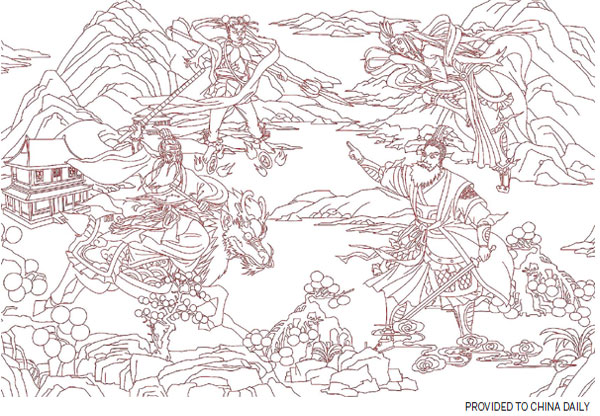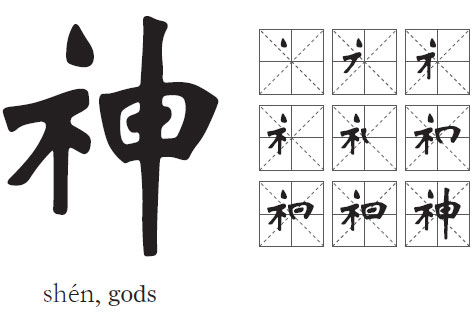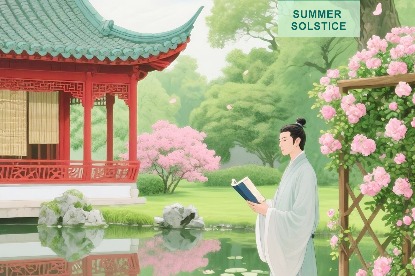Fantasy-filled game of gods

A must-read ancient novel for fans of classic Chinese literature 在战火纷飞和朝代更迭中,众神就这样诞生了
Dynasties fall, deities are born, soldiers fight to their last, and gods take to the field of battle. Creation of the Gods, or Fengshen Yanyi (《封神演义》), is an oft-overlooked Chinese masterpiece of fiction and history that marries the wonder of an ancient world of gods and demons with an inevitable war to destroy a corrupt dynasty. This 16th century novel will sate an appetite for the mystic, adventurous histrionics of classic Chinese storytelling. It provides an insight into the Chinese folk legends and beliefs that have given cause for wonder for thousands of years.
As with the famous opus to the Monkey King, Creation of the Gods is what is called a shenmo xiaoshuo (神魔小说) or "gods and demons fiction". The events of the book take place in the reign of King Zhou (商纣王) who ruled from 1075-1046 BC during the Shang Dynasty (c.16th century-11th century BC) - an almost primeval time. The historical events are loosely based on the famous account of Sima Qian, Records of the Grand Historian (《史记》), but these historical characters soon find themselves up against religious super-weapons and mythic monsters. The story itself is very much in the hands of fate - the heroes and devils decided long in advance.


Perhaps the Master of Clouds (云中子) put it best: "First the Shang Dynasty must come to an end; second, the Zhou Dynasty (c. 11th century-256 BC) is rising to replace it; third, immortals will meet with disaster; fourth, Jiang Ziya will enjoy worldly glory; and fifth, gods are to be created".
Fengshen Yanyi recounts the creation of 365 celestial deities, and they all get their start with the overly familiar King Zhou. His great sin amounts to blasphemy regarding a poem written to the goddess Nuwa (女娲), the creator of mankind. On her birthday, the king, then known as a just and wise sovereign, wrote a poem in her temple, ending with the lines, "I pray that you come alive, with sweet voice and gentle movements, and I'll bring you along to my palace". His meaning was clear and unfortunately for King Zhou, his dynasty, and countless lives, it was also obvious to Nuwa; she took severe umbrage at his overt familiarity. Her response was: "He doesn't think how to protect his country with virtue and morality. On the contrary, he shows no fear of Heaven and insults me with his dirty poem. How vile he is! The Shang Dynasty's already ruled for 600 years and is coming to an end."
Hatred of King Zhou and his characterization as the villain is hardly the stuff of fiction. He is still reviled as an evil and unfit emperor. And, while the goddess Nuwa was his ultimate undoing, the source of his wickedness and debauchery comes from another female character, quite possibly the greatest female villain in all of Chinese literature: Daji (妲己).
Daji is Nuwa's weapon against King Zhou. But she is not Daji, daughter of Su Hu. Rather, she is a 1,000-year-old fox-spirit sent by Nuwa to kill and possess the innocent and beautiful Daji to destroy King Zhou. The fox-spirit does indeed "suck out Daji's soul and occupy her body". Enamored with the newly possessed Daji, King Zhou becomes both distracted and cruel. Rather than simply ruining the Shang Dynasty, Daji turns to incredible acts of cruelty and hedonism.
By Chapter 6, Daji has designed a torture implement that "uses a hollow pillar of brass, 6 meters in height and 2.4 meters in circumference. It has three doors in its upper, middle, and lower part, through which charcoal is placed inside". Criminals are then stripped and chained to the red hot pillar until their "bones, flesh and blood will turn into fetid smoke and disappear." It is called The Bronze Toaster (炮烙之刑).
By Chapter 17, fully enthralled and under Daji's spell, King Zhou constructs a 15-meter-deep pit filled with poisonous spiders and snakes in which he throws 72 maidens who were bound, shaved, and stripped before their execution: "King Zhou watched as they were thrown into the pit. The serpents coiled around them, devouring their flesh and boring into their intestines." King Zhou then turned to Daji and said: "This ingenious invention of yours is really too wonderful for words."
Perhaps even more famous are the constructions of profligacy, one of which is the Meat Forest: 50 women and 50 eunuchs were set loose on a swimming pool of wine and a "forest" of cooked meat. Once inebriated, a select few of the merrymakers would be savagely beaten to death and taken to Daji, who, as it happens, needed to subsist on a diet of human flesh.
With villains as interesting and brutal as this, the hero of our tale is the great Jiang Ziya (姜子牙), regarded as one of the greatest military strategists in Chinese history. In Creation of the Gods, however, he cuts a somewhat humble (yet almost entirely unbeatable) figure, not least because he has the power of divination. The real and legendary tales of Jiang Ziya are well-known throughout China, but he is so much more in Creation of the Gods: a genius, a saint, a tool of the gods, a magician, a fortune teller, and by the end of the novel he is able to impart divinity on the living and the dead.
While it is easy to look on the battle as one of good versus evil, it is made clear from the outset that all of the characters in the story are puppets of fate. So, while one general may fight ruthlessly against hero Jiang Ziya's army, the general may do so honorably and in the service of his emperor, thus ensuring eventual divinity at the mortal hands of Jiang Ziya.
The book itself is oft seen as something of a controversy, with authorship attributed back and forth by angry ancient scholars from Xu Zhonglin (徐仲琳) to Lu Xixing (陆西星). Even the mysticism is suspect; Taoism, for example, plays an extremely important role, despite the fact that Taoism did not come into existence for another 500 years in the novel's timeline. But, such is often the case with great works of ancient Chinese fiction, taking weeks to read and lifetimes to appreciate.
Journey to the West, Dream of the Red Mansion, Three Kingdoms, Outlaws of the Marsh - you cannot move to China without someone telling you how you simply must read them, but there is so much more once that mighty canon is finished. For those inclined toward ancient Chinese battles, primordial weapons of horrific power, and drama, there is Creation of the Gods.
Courtesy of The World of Chinese, www.theworldofchinese.com
The World of Chinese
(China Daily Africa Weekly 12/12/2014 page27)
Today's Top News
- Launch ceremony for Japanese version of Xi's discourses on Chinese modernization held in Tokyo
- Taiwan's chip gamble will spell its doom
- US visa policy policing students
- Generative AI facilitates smart governance
- Africa's green transition gets fresh vitality
- China-EU green ties set to expand






























